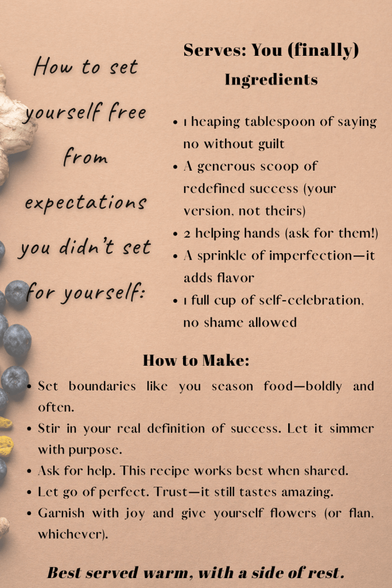Why We Don’t Have to Do It All — Not in Life, Not in Fiction
Being a Latina woman often feels like carrying the world’s weight on your shoulders.
From a young age, many of us are taught to juggle everything: be the caretaker, excel at work, preserve traditions, and maintain a spotless home. I’m literally writing this while taking a break from mopping the floor. That’s the rhythm we’re taught—clean, cook, work, smile. Repeat.
We are expected to be everything to everyone—the selfless mother, the devoted daughter, the hardworking professional, and the keeper of cultural values. But at what cost?
The Roots of the Expectation
The pressure to “do it all” isn’t just modern hustle culture—it’s deeply rooted in our cultural upbringing and generational patterns. In many Latine households, the idea of marianismo—the counterpart to machismo—reinforces that we should be self-sacrificing, nurturing, and morally unshakeable. And while these traits are often praised, they can quietly become cages.
Cultural sayings like “La mujer es el corazón del hogar” (The woman is the heart of the home) sound beautiful… until you realize how heavy it is to be the heart of something every single day. To never skip a beat. To feel like if you fall apart, so does everything else.
The Modern-Day Pressure Cooker
Today, we’re straddling two worlds. We chase careers, passions, education—and still feel expected to carry on all the domestic traditions without missing a step. That duality? It often leads to burnout, guilt, and an invisible scale we can never balance.
Social media intensifies it. One scroll and you see other women baking from scratch, launching businesses, looking flawless, raising kids, honoring culture—and doing it all in perfect lighting. The unspoken rule becomes: if you’re not doing it all—and perfectly—you’re not enough.
But here’s the thing: that’s a lie.
And it’s one I’ve not only had to unlearn for myself, but it’s also one I’ve written into my characters—because these expectations don’t just weigh on real people. They bleed into our inner lives, our self-worth, our sense of possibility. That’s why I gave this burden to Marisol Espinal in The Ordinary Bruja.
Marisol Espinal: A Reflection of Us
Marisol may live in a world touched by ancestral magic, but the pressure she carries is all too real. She’s the product of generations of silence, of cultural rules passed down without explanation. She’s expected to behave, to stay grounded, to not “make things up,” to hold the family’s reputation while trying to uncover its truth. She’s expected to be reliable and ordinary, even as the unexplainable calls to her.
And that’s the story for so many of us, right? Be dependable. Be useful. Be strong. But never too much. Never too loud, too angry, too curious, too bold. Never too yourself.
Marisol’s story reflects what happens when those expectations become internalized—when someone begins to wonder if the life they actually want is too far from the one they’re expected to live. She doesn’t rebel outwardly at first. She folds in on herself, quietly suffocated. And that, to me, is far more common and far more devastating than we like to admit.
Breaking the Pattern—In Fiction and in Life
So how do we break free?
Here’s what I’ve learned—and what I’ve written into both my life and my work:
Set Boundaries: Saying “no” is a powerful act of self-preservation. Not everything deserves your yes.
Redefine Success: Maybe success isn’t doing everything. Maybe it’s choosing what matters and doing that with your whole heart.
Ask for Help: You don’t need to be the only one scrubbing floors. You know who helped me clean my house today? My husband and our kids—because it’s our house. Shared space means shared responsibility.
Embrace Imperfection: The dishes can wait. You can’t. Your peace is more important than your productivity.
Celebrate Yourself: You’re here. You’re doing the work. That deserves to be seen and celebrated.
Moving Forward
The cultural expectations placed on Latine women are real—and they are heavy. But they don’t have to define us.
We’re allowed to change the narrative.
We’re allowed to drop what doesn’t serve us.
And we’re allowed to write ourselves into stories where the main character—like Marisol—gets to choose herself.
So whether you’re a real-life mujer balancing everything or a reader watching Marisol learn to stop holding it all in… I hope you find relief in the knowing:
You don’t have to do it all to be worthy.
You are enough—just as you are.
#breakingCycles #culturalExpectations #generationalPressure #identityInFiction #latineStorytelling #latineWomanhood #marisolEspinal #ownvoicesAuthor #TheOrdinaryBruja #writingComplexCharacters









